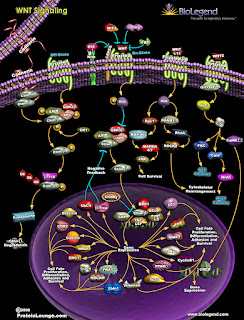"How sea stars get their symmetry (MIT Whitehead Institute).
This headline, in Kipling Just-So Story format, promises understanding
of how something arose—in this case, a gene with the funny name
“dishevelled”. The understanding never comes. What the reader gets
instead is an assumption of evolution.
Dishevelled — so named because a mutation in the
homologous protein in fruit flies lends their tiny hairs a messy, tousled look — is a component of a common signaling pathway called the Wnt pathway, which is found in many creatures throughout the animal kingdom. The pathway serves various purposes in the cells, from body patterning to cell proliferation. “The Wnt pathway is evolutionarily ancient,” Swartz said. “Jellyfish use it, sea stars use it, people use it, and I think that’s really quite profound.”
If we take a “just the facts” approach to this article, we learn two
things:
(1) Many animals use the Wnt pathway, and
(2) It serves various
purposes.
It may be “ancient” (as ancient as the first sea star or
jellyfish), but it is not ipso facto evolutionarily ancient.
Zak Swartz, a postdoc at MIT, repeats the error in the last sentence. He
thinks the ability to activate the dishevelled gene is “a really
critical feature of the evolution of the animal body plan.”
*The follow-up response needs to be, “But how
did the animal body plan evolve?” Where did the complex, hierarchical
information for a body plan come from? That is the central mystery in
the Cambrian explosion, about which evolutionists have no answers—only
assumptions that “it evolved.” They assume the very thing they need to
prove. The presence and function of the dishevelled gene in sea stars is
not the issue. The origin of the sea star body plan, and the Wnt
pathway, is the issue. Evolutionists are imposing their emotions (“I
think that’s really quite profound”) on top of the evidence."
For the wisdom of this world is foolishness with God. 1 Corinthians 3:19

